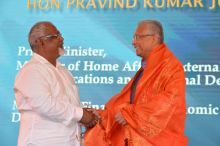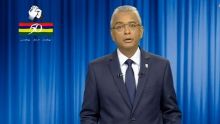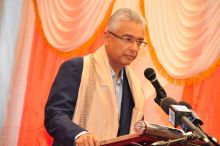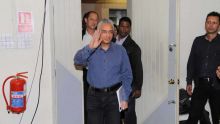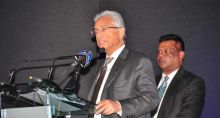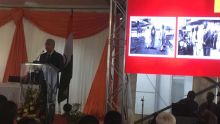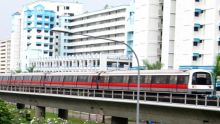Finance Minister Pravind Jugnauth met the press last Friday to present the state of the economy, the performance since December 2014 and to highlight the huge challenges ahead. The Budget 2016/2017 will be presented on Friday 29 July 2016.
Publicité
It was an important meeting with the press, two weeks ahead of the presentation of the 2016/2017 Budget. Finance Minister Pravind Jugnauth has recalled the economic performance of the government and explained the huge challenges that Mauritius will face in the coming years. According to him, many economic sectors were in decline, for instance the construction sector (-8.5%) and the sugar (-3.5%). These indicators show that the economy had slowed down, and that any recovery would be possible only through long-term planning.
End of 2014
GDP growth was estimated at 3.6%in December 2014. Total investment was 18.9%. Private sector investment had declined and stood at a rate of 14.1%, while public investment was 4.8%. Regarding savings, the trend was also downward, set at a rate of 10.5% of Gross Domestic Product (GDP). Unemployment, another important indicator, was already 7.8%, representing 44,800 unemployed. Young people (19,500) and women (25,400) were the most affected by the mismatch between market demand and available skills. Inflation rate had reached 3.2%, while the current account of the balance of payments showed a deficit equivalent to 5.6% of GDP. With regard to foreign reserves, 6.2 months’ worth of imports were covered, while the budget deficit was 3.2% and public debt represented 53.6% of GDP.
Institutions in the red
Among public institutions that have been facing financial difficulties, there was the Mauritius Post and Cooperative Bank (MPCB), with non-performing loans amounting to Rs 3.2 billion; the Development Bank of Mauritius (DBM), with losses totalling Rs 538 million; the Mauritius Post Ltd, cumulating losses of Rs 202 million; the State casinos plagued by losses of Rs 628 million; and the Mauritius Broadcasting Corporation (MBC) which was fraught with Rs1,2 billion worth of debt.
Projects with cost overrun
- The Bagatelle Dam: The initial cost of the project, which was Rs 3.1 billion, doubled to reach Rs 6.2 billion, without counting additional forthcoming investments.
- The Terre Rouge / Verdun Motorway: The initial cost of the project was set at Rs 2 billion, but its completion soared to Rs 4 billion. Subsequent damage due to the non-performing of required geotechnical tests involve additional expenditure of some Rs 300 million for repair works.
- The Ring Road: The initial cost which was Rs 1.3 billion was increased to Rs 1.7 billion. The collapse of part of the road unavoidably entails additional expenses.
- Other public projects saw increase in budgeted costs, for example the biometric identity card project which, initially estimated at Rs 400 million, finally cost Rs 1.2 billion to the government.
2015 revisited
The year 2015 saw a number of major decisions taken, and which cost a lot to the State. However, the Finance Minister justified those decisions, claiming they were essential for social redress. For example, the old age pension was raised, as well as other social aids. Salary compensation was Rs 600. These initiatives have contributed to boost purchasing power by Rs 4.7 billion through increased pensions and Rs 4 billion through wage compensation. An amount of Rs 3 billion had also been earmarked for the wage increase recommended by the PRB, for 85,000 employees and 25,000 pensioners of the public service.
Economic growth
Regarding our economic performance, due to an uncertain international environment, many countries have seen a decline in their annual growth. However, the growth rate of the Mauritian economy was 3% for 2014/2015 and it is expected to rise to 3.6% for the financial year 2015/2016. At the sectoral level, the figures are as follows: The construction sector experienced a decrease of 4.9% in 2015, compared to a decrease of 8.5% in 2014. The tourism sector grew by 8.5% in 2015, compared to 6.1% in 2014.
The ICT sector grew by 7% in 2015, compared to 6.4% in 2014. With regard to unemployment, a rate of 7.6% was recorded for the first quarter of 2016, a decrease from 8.7% during the corresponding period in 2015. Inflation, which is at 1.3%, is falling, while the current account of the balance of payments improved in 2015, the deficit having decreased from 5.6% of GDP in 2014 to 4.8 % of GDP in 2015. Furthermore, the balance of payments also recorded a surplus of Rs 20 billion in 2015, the equivalent of 4.9% of GDP. Regarding foreign reserves, 8.5 months’ worth of imports amounting to Rs 168 billion was covered in June 2016, compared to only 6.2 months (Rs 124 billion) in December 2014.
Major challenges
The country is poised to face major challenges in the coming years. Mauritius aims to be a high income country and this is possible only if the growth rate is higher. A higher growth rate will entail job creation as well as open wider opportunities for entrepreneurs. However, one of the major obstacles to economic growth is a low level of private sector investment. But should the government make up for the lack of investment when higher public spending will only increase the budget deficit and the public debt? This is a tricky question. Other challenges include an ageing population, which is a reality for Mauritius. The ‘Brexit’ is another international factor that will definitely impact on the economy. It will affect our sugar, our textiles and our tourism.
Public debt
The Finance Minister said he will prioritise fiscal discipline and financial prudence in the wake of rising public debt, which has already reached 65% of GDP at the end of March 2016. The government has a daunting task to bring the public debt level to 50% of GDP in 2018.
Traditional pillars
The four traditional economic pillars, namely sugar, tourism, manufacturing and financial services are struggling to cope with increased competition on the international front. It is necessary to come up with new innovative measures to reboost these sectors and save thousands of jobs.
Economic debate on Radio Plus
Will the new Finance Minister be able to boost the economy? Abdoollah Earally asked the question to his two guests on Radio Plus on Tuesday, namely Gerard Sanspeur, Special Adviser at the Ministry of Finance and Economic Development and Eric Ng, economist in the private sector. Gerard Sanspeur revealed that the Finance Minister is taking a lot of time to work on the Budget and doing many consultations in order to grasp the main issues at stake. According to him, normally, 85 percent of the Budget is the work of civil servants and the minister contributes 1 percent. But this time, there is a drastic change in the way the Budget is being prepared, with the minister being more involved in the preparation as there is a strong will to depart from the past. This Budget must be totally different from what we have seen in the past. He said the minister will have his own orientation as he is looking at long term objectives.
Eric Ng said he is agreeable with a new type of Budget exercise if this eliminates bureaucracy and removes emphasis on sectors such as property development and puts more focus on other productive sectors like manufacturing. He said we have wasted one and a half year already as last year’s Budget did not achieve much. But Gerard Sanspeur retorted that we cannot speak of one year lost, as we inherited a disastrous economic context in 2014. He said there had been lots of cases of mismanagement and waste of public funds during the past ten years. For Eric Ng, some forms of mismanagement of public funds continue to take place even now. He spoke of the need to rationalise parastatal bodies and reform the public sector by bringing a new work culture geared towards more efficiency and quality of service. Gerard Sanspeur said he expects a Budget that is realistic, pragmatic and that contains which are easily implementable so that the public can monitor results.

Notre service WhatsApp. Vous êtes témoins d`un événement d`actualité ou d`une scène insolite? Envoyez-nous vos photos ou vidéos sur le 5 259 82 00 !




















